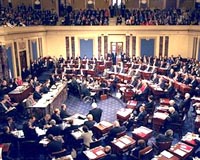| . |  |
. |
Bangkok (AFP) Oct 1, 2009 A deadly typhoon that scythed through Southeast Asia has underscored the area's vulnerability to climate change -- but it may have also finally given regional nations a voice at crucial environment talks. Delegates from 192 countries are meeting in Bangkok until October 9 in a desperate bid to thrash out the draft text of a global warming treaty that world leaders aim to sign in Copenhagen in December. Small nations most likely to suffer the effects of global warming have in the past been overshadowed in climate talks, with major greenhouse gas emitters such as the United States, Europe, China and India taking centre-stage. But after Typhoon Ketsana killed more than 300 people in the Philippines, Vietnam, Cambodia and Laos this week, Southeast Asian nations suddenly found themselves with a podium from which to call on richer nations to do more. "These countries (in Southeast Asia) in a way are the canary in the mine, they're the ones that will be confronted by the impacts of climate change if we fail to reach an agreement in Copenhagen," UN Climate Chief Yvo de Boer told AFP. He said that Southeast Asia's long coastlines and high population density make it one of the world's most vulnerable areas if global warming continues. "We're in a region that's going to be incredibly impacted by climate change -- that goes for the coastal cities that are likely to be impacted by sea level rise that are already affected by severe storms, flooding, changing weather patterns," he said. The Philippines made an impassioned plea at the Bangkok talks on Wednesday, saying that Typhoon Ketsana showed the need for developed nations to cut emissions. The disaster-prone country's chief negotiator Secretary Heherson Alvarez said that if the storm spurred richer countries to act then "the ruin and the pain may not have been in vain." The Bangkok talks have been mired in the same row between developed and developing nations as previous climate negotiations -- over who should cut carbon emissions and pay for the necessary steps. Poorer nations effectively say they will not slow their development and the West must cut back first on emissions, as well as paying for the cost of adapting to climate change. Developing countries will need up to 100 billion dollars (80 billion euros) a year for 40 years to combat the effects, a World Bank report said on Tuesday. Richer nations say that the developing nations, especially the major emitters of tomorrow, should also pledge to curb their output of greenhouse gases. The debate has until now left Southeast Asian nations on the sidelines, since they are generally asking for aid to help cope with the effects -- without having the negotiating clout linked to emissions cuts pledges. But that could now be changing. Indonesia, Southeast Asia's most populous nation, took a stand at the talks earlier this week when officials said President Susilo Bambang Yudhoyono was planning to cut emissions by up to 26 percent. Indonesia is one of the leading forest destroyers and the world's third-largest greenhouse gas emitter, according to some climate experts, but has also been a key advocate for a scheme to pay countries to conserve carbon-absorbing forests. Regional nations could also gang together under the banner of the 10-member Association of Southeast Asian Nations (ASEAN) bloc. "ASEAN countries have a much better chance of addressing climate change collectively rather than individually," Catherine Wong Mei Ling, a research associate at the Institute of Southeast Asian Studies, wrote in Singapore's Straits Times this month. "The grouping can also more easily secure funding and technology transfers as a regional bloc by offering developed countries access to a wider market." Indonesia's national climate change committee head, Agus Purnomo, said however that such a stance was hard to achieve. "A united ASEAN position would be difficult. It's not completely closed off but there have been no agreements because all the countries are very different," Purnomo told AFP. In the meantime, individual nations are increasingly taking their own measures. Vietnam, where Typhoon Ketsana killed 74 people, is taking climate change "very seriously" and had started to commit funds and resources to combating its effects, said Koos Neefjes, climate change adviser to the UN in Hanoi. The island state of Singapore is also vulnerable. A spokesman from the Ministry of Environment and Water Resources said it had commissioned a study to help Singapore identify and plan for adaptation measures. burs-dk/hg/jw Share This Article With Planet Earth
Related Links Climate Science News - Modeling, Mitigation Adaptation
 US Senate begins climate change battle
US Senate begins climate change battleWashington (AFP) Sept 30, 2009 A pitched battle over climate change took off Wednesday in the US Senate, as leading Democratic lawmakers unveiled a bill unlikely to be completed before a key international conference in December. "We need to act now and get the job done," Democratic Senator John Kerry, chairman of the Senate Foreign Affairs Committee, told a crowd of over 300 environmental activists who gathered on the ... read more |
|
| The content herein, unless otherwise known to be public domain, are Copyright 1995-2009 - SpaceDaily. AFP and UPI Wire Stories are copyright Agence France-Presse and United Press International. ESA Portal Reports are copyright European Space Agency. All NASA sourced material is public domain. Additional copyrights may apply in whole or part to other bona fide parties. Advertising does not imply endorsement,agreement or approval of any opinions, statements or information provided by SpaceDaily on any Web page published or hosted by SpaceDaily. Privacy Statement |